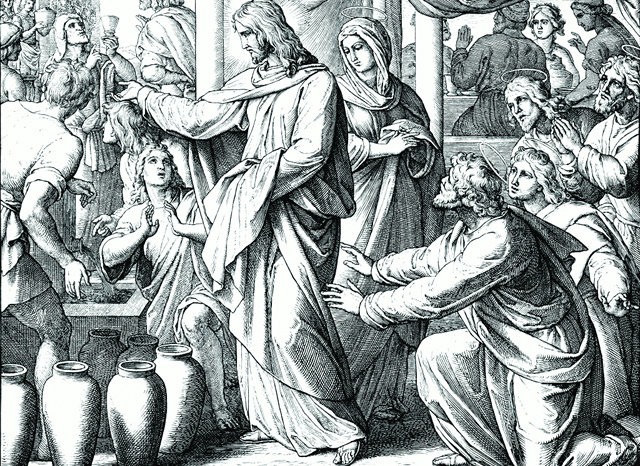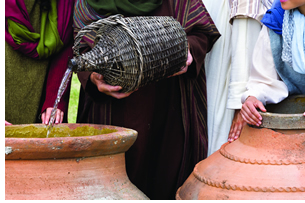
“Do Whatever He Tells You”
Seven Lessons from the Wedding in Cana
Invite Jesus
“Jesus also was invited to the wedding with his disciples” (John 2:2).
It’s a wonderful thing to invite Jesus into our lives—into our everyday lives—so He can take part in what we’re experiencing. The problem is, we’ve developed a mindset that needs correcting. We think that if we’ve invited Jesus into our lives, then everything should be smooth sailing from now on. There’s a pervasive assumption that once we accept Jesus, He will end all our suffering. But that’s not what the Bible teaches.
A storm once arose while Jesus was in a boat with the disciples. The waves sweeping over them were so strong that water poured into the boat. The disciples cried out in despair, “Teacher, do you not care that we are perishing?” (Mark 4:38b). In Psalm 73, the psalmist laments that the wicked seem to prosper while he suffers trials daily.
The Bible makes it clear that we won’t be preserved from difficulties, trials, problems, or even suffering. But those who have invited Jesus into their lives will never be disappointed. Instead, they will experience that Jesus is our help and becomes the consolation that no one else could be. Paul refers to Him as “he who is blessed forever” (2 Cor 11:31), in response to all the troubles the Lord has helped him through.
Mary’s Example
“When the wine ran out, the mother of Jesus said to him, ‘They have no wine’” (John 2:3).
We can learn a lot from Mary’s actions at the wedding in Cana. She wasn’t indifferent to what was happening at the wedding of her friends or relatives. She could have reacted like Cain, who said, “Am I my brother’s keeper?”—Why should I care whether or not there’s enough wine?
Mary acted on the principle of Philippians 2:4: “Let each of you look not only to his own interests, but also to the interests of others.” Being concerned with one another’s problems and sharing burdens is the true character of a Christian: “Bear one another’s burdens, and so fulfill the law of Christ” (Gal 6:2).
The next thing we can learn from her is that she immediately went to Jesus with the problem at hand. Where are we going with our problems? Peter also followed this example: “Now Simon’s mother-in-law lay ill with a fever, and immediately they told him about her” (Mark 1:30).
Tell Jesus about your problems, when something is missing and your needs are pressing. He understands them. He’s the one who can help. That’s why we want to (and should!) act according to Hebrews 4:16 at all times: “Let us then with confidence draw near to the throne of grace, that we may receive mercy and find grace to help in time of need.”
His Hour Is Not Ours
“And Jesus said to her, ‘Woman, what does this have to do with me? My hour has not yet come’” (John 2:4).
Jesus always acted according to His Father’s wishes. Maintaining his dignity or false motives didn’t determine His actions the way it often is with us. It’s possible that Mary’s wishes were based on human reasoning. She may have wanted to fix the situation, to save those responsible from embarrassment due to their miscalculation or stinginess, etc.
Jesus acted with a single motive: to glorify the Father. We also see that in the story of Lazarus in John 11. Jesus’ “hour” was not the hour of Mary and Martha. By their understanding, the Lord had come too late. And yet it was the right hour when Jesus appeared, because He said, “and for your sake I am glad that I was not there, so that you may believe…” (John 11:15).
Jesus’ actions had a goal and served a purpose. His hour is not ours, but it is always the right one. You can also believe that His hour will come and that He will intervene at the right time, even if you think He’s too late. If things seem drawn out, believe that He will make them right. Our Lord knows what is good and proper, even now in this hour of your life.
He Will Make It Right
“His mother said to the servants, ‘Do whatever he tells you’” (John 2:5).
When Mary brought her request to Jesus (that is, surrendered it to Him), His response was hardly encouraging: “And Jesus said to her, ‘Woman, what does this have to do with me? My hour has not yet come’” (v. 4).
How do we react when our prayers go unanswered? Do we give up in disappointment and let it drop, or do we react like Mary? She accepted the situation, left it to Him and said, “Do whatever he tells you.”
She submitted to Him completely. How often do we find ourselves telling God what He needs to do, and how and when. We must learn that He is the Lord, and He is the one to decide—not us. Mary submitted herself completely to Him, though she didn’t understand.
He will make it right. Mary reacted in the same way at the Annunciation, even though she couldn’t explain or understand any of it: “And Mary said, ‘Behold, I am the servant of the Lord; let it be to me according to your word’” (Luke 1:38).
Zechariah wasn’t able to act that way. He remained so tangled up in his own mind that it got in the way of his faith. But God’s Word says: “Trust in the Lord with all your heart, and do not lean on your own understanding. In all your ways acknowledge him, and he will make straight your paths” (Prov 3:5-6).
 Nothing Happens Without Empty Vessels
Nothing Happens Without Empty Vessels
“Jesus said to the servants, ‘Fill the jars with water.’ And they filled them up to the brim” (John 2:7).
There were six water jugs in the house where the wedding at Cana took place. The number six indicates humanity. When we read 2 Corinthians 4:7, there is another reference to vessels: “But we have this treasure in jars of clay, to show that the surpassing power belongs to God and not to us.”
We are like the empty vessel. When we fill our lives with water, it glorifies Jesus. The water is a depiction of the Word of God. Whoever fills his life with God’s Word (as it says, “They filled them up to the brim”) is glorifying Jesus.
 The more we fill our lives with God’s Word, the more glorious the result will be. Others enjoyed the fruit, and Jesus received the glory. It is the same in our life. If we are empty vessels and let God’s Word fill us, others will marvel and acknowledge that we give off the sweet aroma of Jesus Christ.
The more we fill our lives with God’s Word, the more glorious the result will be. Others enjoyed the fruit, and Jesus received the glory. It is the same in our life. If we are empty vessels and let God’s Word fill us, others will marvel and acknowledge that we give off the sweet aroma of Jesus Christ.
Let’s do as He tells us and present ourselves as empty vessels, ready to be filled with water so the glory of Jesus can be seen in us. The question remains: are we empty vessels that want to be filled with God’s Word? Then we will marvel at what Jesus does through us. Our job is to do what we’re able to, and He will do the rest. But without empty vessels, nothing can happen.
The Way to Produce the Best Wine
“When the master of the feast tasted the water now become wine, and did not know where it came from (though the servants who had drawn the water knew), the master of the feast called the bridegroom and said to him, ‘Everyone serves the good wine first, and when people have drunk freely, then the poor wine. But you have kept the good wine until now’” (John 2:9-10).
Running out of wine led to the glorious experience of the miracle. If we cooperate with Jesus in our own lives as the servants did—that is, if we do what He says—then we will receive new blessings out of our difficulties, tribulations, and trials.
Any hardship you may be in the midst of, serves the purpose of increasing your blessings. The wine that Jesus makes is better than the wine that people produce. What we accomplish with Jesus goes beyond all human intelligence and ability. What matters is that we’re working together with Jesus. That’s how the best wine is produced—namely, the best fruit.
It’s just a question of whether we’re working and living in harmony with Jesus during times of adversity and difficulty. Sometimes we do the opposite: we rebel, grumble, and blame God for the lack of wine. We think to ourselves, “God shouldn’t have allowed that to happen!” But if we submit to His Word and authority and do our duty as servants, then we will enjoy the best wine and praise Him for His miracles in our lives.
The Best Is Yet to Come
“Everyone serves the good wine first, and when people have drunk freely, then the poor wine. But you have kept the good wine until now” (John 2:10).
In this first miracle, which Jesus performed at the wedding in Cana, we see a biblical principle that can greatly encourage us: The better wine came at the end. We could also say it this way: The best is yet to come.
This principle still applies to us as believers. After the disappointment of the wine running out, came the unexpected surprise of a better vintage, brought about by Jesus’ miracle. It’s the same for us: After humiliation comes exaltation. After tribulation, expansion and deliverance.
If you’re in a phase of life right now where you don’t know how to proceed, or if you’re asking yourself why things are happening to you, then tell Jesus about it. He will change your situation for the better. He has the last word, and what’s coming will be more glorious than what exists now. We’re waiting for the best.
Those who have invited Jesus into their lives, should know that the best is yet to come. It will be so wonderful that it will amaze us all. So, count on Jesus and what He can do.
Midnight Call - 10/2022

